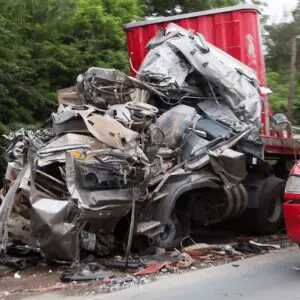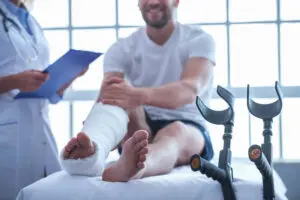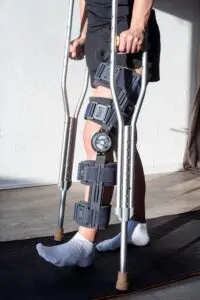 When an 80,000-pound commercial truck collides with a 3,000-pound passenger vehicle on Interstate 81 near Hazleton, the resulting injuries are often catastrophic and life-changing. The sheer physics of these truck accidents creates devastating consequences that extend far beyond what most people experience in typical car crashes. Understanding the most common injuries sustained in a truck accident can help victims and their families prepare for the challenging road ahead and recognize the full scope of compensation they may need.
When an 80,000-pound commercial truck collides with a 3,000-pound passenger vehicle on Interstate 81 near Hazleton, the resulting injuries are often catastrophic and life-changing. The sheer physics of these truck accidents creates devastating consequences that extend far beyond what most people experience in typical car crashes. Understanding the most common injuries sustained in a truck accident can help victims and their families prepare for the challenging road ahead and recognize the full scope of compensation they may need.
The most common injuries sustained when a truck accident occurs in Hazleton include traumatic brain injuries, spinal cord damage, severe burns, multiple bone fractures, internal organ damage, and psychological trauma. These injuries often occur simultaneously, creating complex medical situations requiring immediate emergency care and specialized treatment. The mountainous terrain around Hazleton and the heavy volume of commercial traffic on Interstate 81 contribute to the severity of these accidents, making comprehensive medical and legal support essential for recovery.
If you or someone you love suffered any injuries in a truck accident, our Hazleton truck accident attorney is here to help. Contact Munley Law today to schedule a free consultation.
Life-Threatening and Catastrophic Injuries Following a Truck Crash
Traumatic brain injuries represent some of the most devastating consequences of truck accidents in the Hazleton area. When the violent forces of a truck collision cause the brain to impact against the skull, the resulting damage can permanently alter a person’s cognitive abilities, personality, and quality of life. Closed head injuries from truck accidents often involve diffuse axonal injury, where the rotational forces of impact tear the brain’s nerve fibers. Victims may experience memory loss, difficulty concentrating, personality changes, and problems with basic daily activities that most people take for granted.
In many cases, symptoms of a brain injury may not appear immediately after the accident. Some victims seem fine initially but develop serious cognitive problems days or weeks later. Brain swelling, bleeding, and other complications can emerge gradually, making immediate medical evaluation at facilities like Lehigh Valley Hospital-Hazleton crucial even when victims feel relatively normal after the accident. The long-term implications of traumatic brain injuries include the need for ongoing neurological care, cognitive rehabilitation, and potential lifetime supervision for daily activities.
Spinal cord injuries from truck accidents often result in permanent paralysis that completely transforms a victim’s life. The tremendous forces involved in these collisions can fracture, dislocate, or crush the vertebrae that protect the spinal cord. Complete spinal cord injuries result in total loss of sensation and movement below the point of injury, while incomplete injuries may leave some function intact. Quadriplegia affects all four limbs and typically results from injuries to the cervical spine, while paraplegia affects the lower body and results from thoracic or lumbar spine damage.
Living with spinal cord injuries in Hazleton’s mountainous terrain presents unique challenges. The area’s hills, older buildings without full accessibility, and harsh winter weather conditions can make daily activities difficult for wheelchair users. Victims often require extensive home modifications, specialized vehicles, and ongoing personal care assistance. The lifetime costs of spinal cord injury care can exceed several million dollars, making adequate legal compensation essential for victims and their families.
Severe burns and multi-system trauma occur when truck accidents involve fuel tank explosions, chemical spills, or fires. Commercial trucks carry large quantities of diesel fuel, and accidents can rupture these tanks, creating dangerous fire hazards. Burn injuries from truck accidents often cover large percentages of the body and require multiple surgeries, skin grafts, and extensive rehabilitation. Chemical burns from hazardous materials transport add another layer of complexity, potentially causing internal damage and long-term health complications.
Crush injuries happen when victims become trapped in or under commercial vehicles during accidents. These injuries can cause compartment syndrome, where swelling cuts off blood flow to muscles and nerves, potentially requiring amputation to save the victim’s life. Multiple organ system failure often accompanies severe crush injuries, requiring intensive care and multiple surgical interventions. The complexity of these injuries demonstrates why truck accident cases require attorneys experienced with catastrophic injury claims and the substantial compensation needed for proper care.
Common Serious Physical Injuries Sustained In a Hazleton Truck Accident
 Broken bones and orthopedic trauma occur in nearly every serious truck accident, but the severity far exceeds typical car accident fractures. The massive forces involved often cause multiple fractures, compound breaks where bones pierce the skin, and joint damage that requires surgical repair. Victims frequently suffer fractures in multiple areas simultaneously, such as broken ribs, fractured arms or legs, and pelvic fractures that can take months or years to heal properly.
Broken bones and orthopedic trauma occur in nearly every serious truck accident, but the severity far exceeds typical car accident fractures. The massive forces involved often cause multiple fractures, compound breaks where bones pierce the skin, and joint damage that requires surgical repair. Victims frequently suffer fractures in multiple areas simultaneously, such as broken ribs, fractured arms or legs, and pelvic fractures that can take months or years to heal properly.
Joint damage from truck accidents often leads to chronic arthritis and permanent mobility limitations. When the cartilage in joints is damaged during the initial trauma, victims may develop painful arthritis that worsens over time. This progression means that truck accident victims may face increasing pain and disability years after their initial recovery, requiring ongoing medical care and potentially limiting their ability to work or enjoy activities they once loved.
Amputation injuries represent some of the most traumatic outcomes of truck accidents. When limbs are crushed beyond repair or blood flow is permanently compromised, surgical amputation may be necessary to save the victim’s life. Using prosthetic devices requires extensive rehabilitation and ongoing adjustments as technology improves. The psychological impact of amputation often requires counseling and support to help victims adapt to their new reality and maintain their mental health during recovery.
Recovery from orthopedic injuries typically involves months of physical therapy and rehabilitation. Regional facilities around Hazleton provide specialized care, but victims often need to travel to larger medical centers for complex procedures or specialized prosthetic fitting. The combination of multiple fractures and soft tissue damage means that recovery timelines are often unpredictable, and some victims never regain their pre-accident level of function.
Internal organ damage from truck accidents can be immediately life-threatening and may have long-term consequences that affect victims for the rest of their lives. The liver, spleen, kidneys, and bowel are particularly vulnerable to damage from the blunt force trauma of truck collisions. Internal bleeding may not be immediately apparent, making rapid medical evaluation essential even when external injuries seem minor.
Emergency surgery is often required to repair damaged organs and stop internal bleeding. These surgeries can be complex and risky, particularly when multiple organs are injured simultaneously. Complications from internal injuries can include infection, organ failure, and the need for additional surgeries months or years later. Some victims require ongoing medical monitoring and may develop chronic health problems related to their internal injuries.
Long-term digestive and organ function problems can significantly impact quality of life. Victims may need to follow restricted diets, take medications for the rest of their lives, or require periodic medical procedures to maintain organ function. These ongoing medical needs create substantial long-term costs and may limit victims’ ability to work in certain occupations or participate in activities they previously enjoyed.
Chest trauma and respiratory injuries from truck accidents can have immediate and long-term consequences for victims’ breathing and heart function. Rib fractures are common and can puncture the lungs, creating pneumothorax or collapsed lung conditions that require emergency treatment. Multiple rib fractures can make breathing extremely painful and may require mechanical ventilation support during recovery.
Cardiac contusion occurs when the heart muscle is bruised during the impact, potentially causing dangerous heart rhythm problems. These injuries may not be immediately apparent but can cause sudden cardiac complications days or weeks after the accident. Long-term monitoring and cardiac care may be necessary to ensure proper heart function and prevent future complications.
Breathing difficulties from chest trauma can persist long after the initial injuries heal. Some victims develop chronic respiratory problems that limit their physical activity and may require ongoing respiratory therapy or medication. These limitations can affect victims’ ability to return to physical jobs or participate in recreational activities, representing significant lifestyle changes that deserve compensation.
Hidden and Psychological Injuries Following a Truck Crash
Post-traumatic stress disorder and other mental health impacts from truck accidents are often overlooked but can be just as debilitating as physical injuries. The terror of being involved in a massive truck collision, combined with the pain and uncertainty of serious injuries, can create lasting psychological trauma. PTSD symptoms may include flashbacks to the accident, nightmares, severe anxiety about driving or traveling, and avoidance of situations that remind victims of their trauma.
 The psychological impact extends beyond the immediate victim to affect family members and loved ones who witness the aftermath of serious truck accidents. Children may develop anxiety about car travel, spouses may struggle with caregiver stress, and entire families may experience financial and emotional strain that affects their relationships and daily functioning. Professional counseling and psychiatric care are often necessary to help families cope with these challenges and maintain their mental health during recovery.
The psychological impact extends beyond the immediate victim to affect family members and loved ones who witness the aftermath of serious truck accidents. Children may develop anxiety about car travel, spouses may struggle with caregiver stress, and entire families may experience financial and emotional strain that affects their relationships and daily functioning. Professional counseling and psychiatric care are often necessary to help families cope with these challenges and maintain their mental health during recovery.
Depression and social isolation commonly develop as victims struggle with physical limitations, chronic pain, and the life changes imposed by their injuries. Many truck accident victims find that they can no longer participate in activities they once enjoyed, work in their chosen careers, or maintain the same level of independence they had before the accident. These losses can trigger significant depression that requires professional treatment and ongoing support.
Delayed-onset injuries present particular challenges because symptoms may not appear until days, weeks, or even months after the truck accident. Whiplash and cervical spine problems are typical examples, as the soft tissues of the neck may not show damage immediately but can develop into chronic pain conditions over time. Herniated discs may not cause symptoms initially, but can progress to require surgery as inflammation develops and pressure on nerves increases.
The delayed nature of these injuries makes immediate medical documentation crucial, even when victims feel relatively normal after the accident. Insurance companies often try to argue that delayed symptoms are unrelated to the accident, making thorough medical records and expert testimony essential for proving the connection between the truck collision and subsequent health problems.
Chronic pain syndromes can develop from seemingly minor injuries and may persist long after other injuries have healed. The trauma of truck accidents can trigger fibromyalgia, complex regional pain syndrome, and other chronic pain conditions and may require ongoing pain management, medication, and lifestyle modifications. These conditions can be particularly frustrating because they may not appear on standard medical tests, making them difficult to prove to insurance companies and juries.
Cognitive and emotional changes from mild traumatic brain injuries often go unrecognized initially but can have profound impacts on victims’ lives. Concentration problems may make it difficult to return to work or manage household responsibilities. Sleep disorders can develop after head trauma, leading to chronic fatigue that affects every aspect of daily life. Memory problems may interfere with relationships and work performance, creating frustration and stress for victims and their families.
The subtle nature of these cognitive changes means insurance companies often dismiss or minimize them despite their significant impact on victims’ quality of life and earning capacity. Proper neuropsychological testing and expert evaluation are often necessary to document these injuries and demonstrate their connection to the truck accident.
Recovery and Long-Term Impact of Truck Accident Injuries
 The recovery timeline for truck accident injuries varies dramatically depending on the severity and type of injuries involved. Still, most serious cases require months or years of intensive medical care and rehabilitation. The acute care phase immediately following the accident focuses on stabilizing life-threatening injuries and preventing complications. This phase may involve multiple surgeries, intensive care unit stays, and coordination between various medical specialists.
The recovery timeline for truck accident injuries varies dramatically depending on the severity and type of injuries involved. Still, most serious cases require months or years of intensive medical care and rehabilitation. The acute care phase immediately following the accident focuses on stabilizing life-threatening injuries and preventing complications. This phase may involve multiple surgeries, intensive care unit stays, and coordination between various medical specialists.
Physical, occupational, and speech therapy often continue for months or years after the initial medical treatment. These rehabilitation services help victims regain function, adapt to permanent limitations, and develop strategies for managing daily activities with their injuries. Local rehabilitation facilities around Hazleton provide some services, but victims with complex injuries often need to travel to specialized centers for advanced treatment options.
Adaptive equipment and home modifications become necessary for many truck accident victims, particularly those with mobility limitations or cognitive impairments. Wheelchair ramps, bathroom modifications, specialized vehicles, and assistive technology can cost tens of thousands of dollars but are essential for maintaining independence and quality of life. These modifications represent just one category of the ongoing expenses that truck accident victims face during recovery.
The financial devastation from truck accident injuries often exceeds what most families can handle without proper legal compensation. Emergency medical costs frequently exceed $100,000 even before considering long-term care needs. Helicopter transport, trauma surgery, intensive care, and specialized medical equipment create enormous bills that can bankrupt families without adequate insurance coverage or legal settlements.
Lost wages and reduced earning capacity compound the financial strain, particularly when primary wage earners cannot return to their previous jobs due to injuries. Many truck accident victims must accept lower-paying positions or may become unable to work, creating permanent changes to their family’s financial situation. The combination of increased medical expenses and reduced income creates an economic crisis that proper legal representation can help address through comprehensive compensation claims.
Family members often experience financial hardships as they take time off work to provide care, modify their homes for accessibility, or relocate to be closer to medical facilities. These secondary economic impacts are often overlooked but represent real costs that families bear due to truck accidents caused by negligence.
Quality of life changes extend beyond financial considerations to affect every aspect of victims’ and families’ daily experiences. Simple grocery shopping, attending children’s school events, or enjoying recreational activities may become impossible or require significant planning and assistance. Relationships may suffer under the strain of caregiver responsibilities, chronic pain, and lifestyle limitations.
Social Security disability benefits may become necessary for victims who cannot return to work, but the application process is complex and often requires legal assistance to navigate successfully. Understanding the interaction between disability benefits and personal injury settlements requires experienced legal guidance to ensure that victims receive maximum compensation without jeopardizing their eligibility for needed government benefits.
Taking Action After a Truck Accident Injury
Immediate medical attention should be your top priority after any truck accident, even if you feel relatively normal initially. The adrenaline and shock of a serious accident can mask symptoms of significant injuries, and some of the most dangerous complications may not be apparent for hours or days after the collision. Emergency room evaluation at Lehigh Valley Hospital-Hazleton or other regional trauma centers can identify hidden injuries and begin the documentation process crucial for future legal claims.
Proper documentation of your injuries begins with that first medical evaluation and continues throughout your recovery. Keep detailed records of all medical appointments, treatments, medications, and how your injuries affect your daily activities. This documentation becomes essential evidence when seeking compensation for your injuries and losses.
Time-sensitive evidence preservation is critical in truck accident cases because important information can be lost or destroyed quickly. Trucking companies may overwrite electronic logging device data, surveillance footage from nearby businesses may be deleted, and witness memories fade over time. Experienced legal representation can immediately begin preserving this crucial evidence while you focus on your medical recovery.
Insurance companies often employ tactics designed to minimize their payouts to truck accident victims, particularly when serious injuries are involved. They may pressure you to accept quick settlements before you understand the full extent of your injuries, or they may dispute the connection between the accident and your symptoms. Experienced legal representation protects you from these tactics and ensures your rights are fully protected throughout the claims process.
 The complexity of truck accident injury cases requires attorneys who understand the medical aspects of serious injuries and the legal strategies necessary to obtain fair compensation. At Munley Law, our experience with catastrophic injury cases in Luzerne County gives us the knowledge and resources needed to build strong cases that account for both current medical expenses and future care needs.
The complexity of truck accident injury cases requires attorneys who understand the medical aspects of serious injuries and the legal strategies necessary to obtain fair compensation. At Munley Law, our experience with catastrophic injury cases in Luzerne County gives us the knowledge and resources needed to build strong cases that account for both current medical expenses and future care needs.
Don’t let the overwhelming nature of serious truck accident injuries prevent you from seeking the help you need and deserve. Contact Munley Law today for a free consultation to discuss your case and learn how we can help you obtain the compensation necessary for your recovery and future security.









